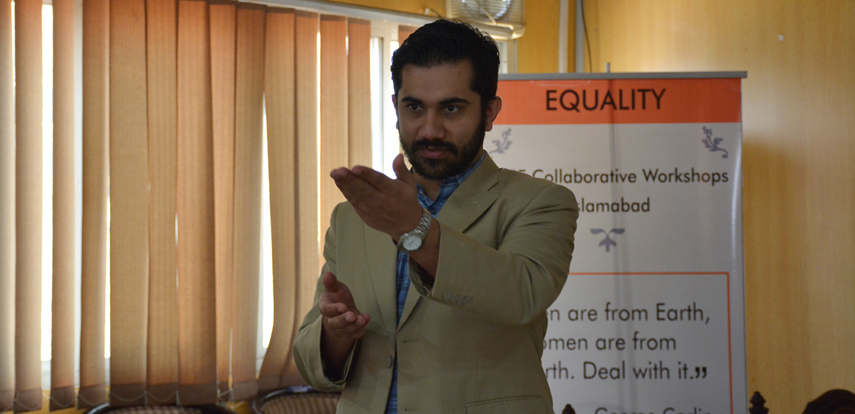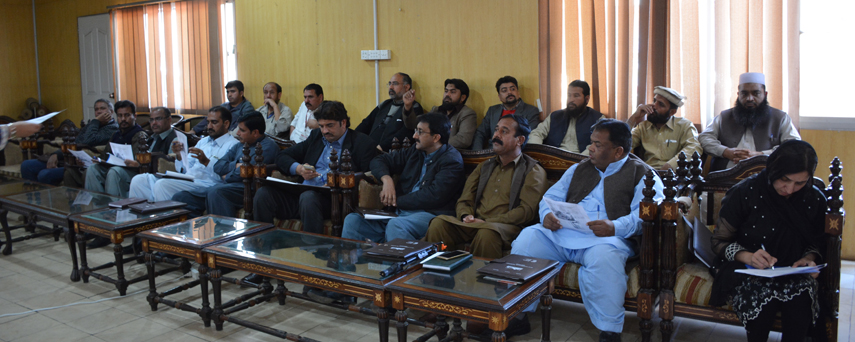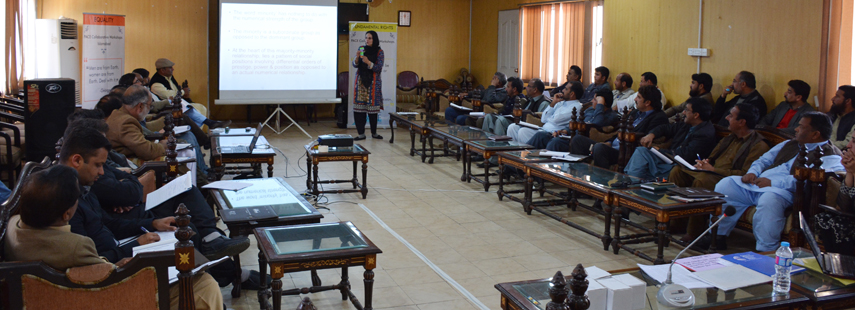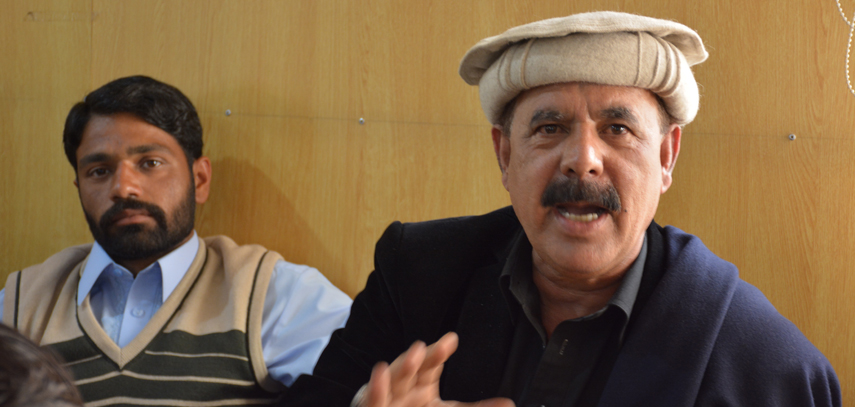Pakistan Center of Excellence (PACE) is a major CVE initiative by the Center for Research and Security Studies (CRSS) designed to trigger critical thinking through a discourse anchored in fundamental global values such as socio-political diversity, acceptance of diversity, rule of law and equal citizenry, as well as the rights afforded within Pakistan’s Constitution (articles 8-28).
The Center for Research and Security Studies (CRSS) conducted a one day PACE Collaborative Workshop with young reporters and journalists from outskirts of Islamabad. The journalists were from Hassan Abdal, Wah Cantt, Murree, Doltana, Jhelum, Gojar Khan and Taxila.
Mr. Zeeshan Salahuddin, Project Manager, welcoming the participants to the workshop said that the main purpose of inviting a diverse group is to gather a wide spectrum of participation and feedback. He elaborated the objectives of the workshop saying that PACE trainings are delivered on equal citizenry, fundamental human rights and diversity which are usually not discussed openly. We will discuss all these issues based on constitutionalism and rule of law in a welfare state.
Journalists influence ideas and opinions of a common person to a large level. It is important for them to be trained in critical soft skills, not taught in our mainstream educational institutions. He said that PACE is grounded in the universal values of tolerance and acceptance; tolerance is one of the virtues that lead to range of other factors such as perseverance, coexistence and the idea of peace building. He elaborated that adherence to rule of law, respect for diversity, opinions and rights, and ideas of perseverance, coexistence, peace building and tolerance can be inculcated in the minds of the youth only by journalists; the opinion multipliers.
Ms. Humaira Masihuddin kicked off the session speaking on the theme of ‘Pluralism and Multiculturalism with Special Reference to Islam”. She started her session saying that human beings belong to one origin and one place, and no purely homogeneous society exists in the modern world. Most societies consist of different ethnic groups. We may define minority as ‘a group of people who are singled out from the other groups and are treated differently because of their physical or cultural characteristics’. Minority is a subordinate group as opposed to the dominant group. The concept of multiculturalism revolves around a society with heterogeneous beliefs and set of ideas. Multiculturalism makes a society diverse. Respect for diversity shapes coexistence, peace, and harmony under a political and institutional framework. Differences should not be seen as challenges instead as a source of strength. She said that every individual has a right to be different and be respected by all for his unique and distinctive characteristics. In Islam, the concept of diversity is clearly inclusive, she continued.
In Quran, she said, human beings are addressed to treat each other without discrimination and respect each other’s beliefs, never use abusive language or disrespect others. If we look at the character of the Holy Prophet (PBUH), it is clearly evident how He always respected the non-Muslims in Mekkah and Medina. Even when on the day Mekkah was conquered by Muslims, Prophet (PBUH) forgave all His enemies for the harms that they had inflicted on Him.
Ms. Humaira also made note of the last sermon of the Holy Prophet that said “All mankind is from Adam and Eve, an Arab has no superiority over a non-Arab nor a non-Arab has any superiority over an Arab; also a white has no superiority over black nor a black has any superiority over white except by piety (taqwa) and good action”. In short, Islam is the religion of tolerance and coexistence, love and peace for everyone regardless of religions or ethnicities. She referred to a verse from the Holy Quran denying the cultural differences: “O mankind, indeed we have created you from male and female and made you peoples and tribes that you may know one another. Indeed, the most noble of you in the sight of Allah is the most righteous of you. Indeed, Allah is all-knowing and acquainted”, Surat Al-Hujurat [verse 13].
Second session of Ms. Masihuddin was on the gap analysis of laws pertaining to minorities and offences against religion. She continued the session saying that over the period of several decades, 10 sections are added into the Chapter XV (15) of the Pakistan Penal Code (PPC). They range from defilement of religious places to insulting religious personages to impersonations. Five of these laws were enacted during British era, while rest of them were passed during Zia era. She discussed some of the sections of PPC in detail:
Section 295 of PPC
Whoever destroys, damages or defiles any place of worship, or any object held sacred by any class of persons with the intention of thereby insulting the religion of any class of persons or with the knowledge that any class of persons is likely to consider such destruction damage or defilement as an insult to their religion. shall be punished with imprisonment of either description for a term which may extend to two years, or with fine, or with both.
Section 295 A:
Whoever, with deliberate and malicious intention of outraging the ‘religious feelings of any class of the citizens of Pakistan, by words, either spoken or written, or by visible representations insults the religion or the religious beliefs of that class, shall be punished with imprisonment of either description for a term which may extend to ten years, or with fine, or with both.
Section 295 B:
Whoever wilfully defiles damages or desecrates a copy of the Holy Qur’an or of an extract therefrom or uses it in any derogatory manner or for any unlawful purpose shall be punishable with imprisonment for life.
She discussed that one the first victim of the 295 B was a Hafiz-e-Quran who was blamed for desecrating a copy of the Holy Quran.
Section 295 C:
Whoever by words, either spoken or written, or by visible representation or by any imputation, innuendo, or insinuation, directly or indirectly, defiles the sacred name of the Holy Prophet Muhammad (peace be upon him) shall be punished with death, or imprisonment for life, and shall also be liable to fine.
Ms. Humaira sharing details about the enactment of this law said that the parliament suggested restricting the sentences to life imprisonment and death penalty. But then someone lodged a petition in Shriah Court that there should only be death penalty in such cases. Seven renowned religious scholars were contacted and most of them were of the opinion that this should not be the case. But minority opinion was opted out and parliament was ordered to follow the rule as it is. No further legislation took place later on.
Section 296:
Whoever voluntarily causes disturbance to any assembly lawfully engaged in the performance of religious worship, or religious ceremonies, shall be punished with imprisonment of either description for a term which may extend to one year, or with fine, or with both.
Section 297:
Whoever, with the intention of wounding the feelings of any person, or of insulting the religion of any person, or with the knowledge that the feelings of any person are likely to be wounded, or that the religion of any person is likely to be insulted thereby, commits any trespass in any place of worship or on any place of sculpture, or any place set apart for the performance of funeral rites or as a, depository for the remains of the dead, or offers any indignity to any human corpse or causes disturbance to any persons assembled for the performance of funeral ceremonies, shall be punished with imprisonment of either description for a term which may extend to one year, or with fine, or with both.
Section 298:
Whoever, with the deliberate intention of wounding the religious feelings of any person, utters any word or makes any sound in the hearing of that person or makes any gesture in the sight of that person or places any object in the sight of that person, shall be punished with imprisonment of either description for a term which may extend to one year or with fine, or with both.
Section 298 A:
Whoever by words, either spoken or written, or by visible representation, or by any imputation, innuendo or insinuation, directly or indirectly, defiles the sacred name of any wife (Ummul Mumineen), or members of the family (Ahle-bait), of the Holy Prophet (peace be upon him), or any of the righteous Caliphs (Khulafa-e-Rashideen) or companions (Sahaaba) of the Holy Prophet (peace be upon him) shall be punished with imprisonment of either description for a term which may extend to three years, or with fine, or with both.
Section 298 B:
Any person of the Quadiani group or the Lahori group (who call themselves ‘Ahmadis’ or by any other name who by words, either spoken or written, or by visible representation-(a)refers to or addresses, any person, other than a Caliph or companion of the Holy Prophet Muhammad (peace be upon him), as “Ameer-ul-Mumineen”, “Khalifatul- Mumineen”, Khalifa-tul-Muslimeen”, “Sahaabi” or “Razi Allah Anho”;(b)refers to, or addresses, any person, other than a wife of the Holy Prophet Muhammad (peace be upon him), as “Ummul-Mumineen”;(c)refers to, or addresses, any person, other than a member of the family “Ahle-bait” of the Holy Prophet Muhammad (peace be upon him), as “Ahle-bait”; or(d)refers to, or names, or calls, his place of worship a “Masjid”;shall be punished with imprisonment of either description for a term which may extend to three years, and shall also be liable to fine.
Any person of the Qaudiani group or Lahori group (who call themselves “Ahmadis” or by any other name) who by words, either spoken or written, or by visible representation refers to the mode or form of call to prayers followed by his faith as “Azan”, or recites Azan as used by the Muslims, shall be punished with imprisonment of either description for a term which may extend to three years, and shall also be liable to fine.
Section 298 C:
Any person of the Quadiani group or the Lahori group (who call themselves ‘Ahmadis’ or by any other name), who directly or indirectly, poses himself as a Muslim, or calls, or refers to, his faith as Islam, or preaches or propagates his faith, or invites others to accept his faith, by words, either spoken or written, or by visible representations, or in any manner whatsoever outrages the religious feelings of Muslims shall be punished with imprisonment of either description for a term which may extend to three years and shall also be liable to fine.
After discussing the laws of religious offense, Ms. Humaira further discussed the history of blasphemy laws. She shared that the history of blasphemy laws is as old as the penal code itself. The British Colonialists were ruling a multicultural and plural society of Hindus, Muslims, Christians, Sikhs, Buddhists, Jains etc. In the PPC drafted by the British there were only 4 sections of religious offense; places of worship, religious assembly, burial places and injuring religious feelings. Common feature of these sections is that all took into account the factor of “intention”. In 1927, 295 A was added for insulting and outraging any person’s religion. It carried a 10 year non-bailable sentence. It was considered an offence against the state under section 196 of CRPC and only the government could become a complainant in it.
During the era of Zia-ul-Haq, five more sections were added increasing the punishments to life imprisonment as well as death penalty.
She referred to a report shared by Lahore High Court Division Bench that acquitted an accused of 295 C who was under death penalty;
“It appears that ever since the law became more stringent, there has been an increase in the number of registration of the blasphemy cases. A report from the Daily Dawn of 18th July, 2002, says that between 1948 and 1979, 11 cases of blasphemy were registered. Three cases were reported between the period 1979 and 1986. Forty four cases were registered between 1987 and 1999. In 2000, fifty two cases were registered and strangely, 43 cases had been registered against the Muslims while 9 cases were registered against the non-Muslims, The report further states that this shows that the law was being abused more blatantly by the Muslims against the Muslims to settle their scores. Because the police would readily register such a case and without checking the veracity of the facts and without taking proper guidance from any well-known and unbiased religious scholar, would proceed to arrest an accused. That an Assistant Sub Inspector or a Moharrir was academically not competent to adjudge whether or not the circumstances constitute act of blasphemy.”
She shared few incidents of blasphemy law being misused by the people and for victimizing the accused without any proof, or on the basis of misunderstanding or personal grudges. She stimulated the discussion saying that Holy Prophet (PBUH) strictly forbade his followers from violating the rights of Christians while signing the Charter of Najran with them.
The last session of Ms. Humaira was on media ethics discussing the values that should be considered while reporting. She stimulated the discussion saying that reporting should not be subjective but objective. A reporter should be truthful, accurate, impartial, fair, and should be careful in sensitive cases. Real spirit of journalism demands confidentiality while reporting.
Freedom of press is crucial, she said. The role of media as watch dogs should always frontline the agenda of rule of law, democracy, human rights, and an understanding of the difference between ‘freedom’ and ‘license’. Misreporting and exaggeration should be avoided, reporting should not create or cause panic among people. The objective of the journalism should not be creating confusion or blackmailing but to spread authentic and accurate news, she said. The social responsibility of journalists is of paramount importance. Journalism is the mirror of a society. A reporter must, therefore, provide a truthful, comprehensive, and intelligent account of the events. The press must serve as a forum for the exchange of comments and criticism. The publication of baseless, graceless and manipulated material should be avoided at all costs in order to safeguard yourself and your organization from the legal clutches.
The profession demands journalists to honor certain professional obligations. Their basic responsibility is to disseminate information in all circumstances. The information provided helps the readers to make up their minds on vital issues and thus shapes their attitudes. Journalists are expected to have commitment to their profession and must strictly adhere to accepted professional norms. News should not be distorted or suppressed. One of the most important responsibilities of a professional journalist is to ensure that in hurry and hast; accuracy in the language is not sacrificed.
Mr. Zeeshan Salahuddin, in his closing remarks said that it is important to inculcate critical thinking in our youth, and to equip them with the art of questioning the pre-established narratives. He said that strict adherence to the rule of law and equal citizenry is the basis of a progressive society and Pakistan needs to embrace these ideals in order to cultivate tolerance and diversity.




